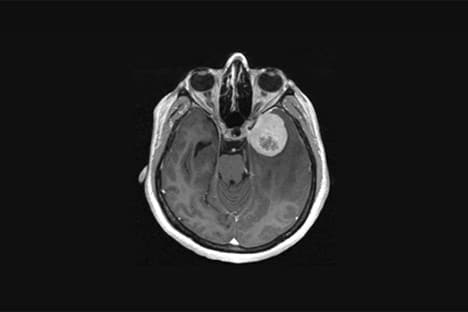HN Summary
•Improved Grading: Evaluating TERT gene expression can enhance the accuracy of meningioma grading, identifying tumours that may behave more aggressively than traditional microscopy suggests.
•Prognostic Value: TERT expression—whether the gene is mutated or not—is linked to poorer progression-free survival, with grade-two TERT-positive tumours resembling grade-three TERT-negative tumours.
•Clinical Impact: Incorporating TERT expression into grading could guide more personalized treatment strategies and better align therapy with tumour behaviour.
A new study, published in The Lancet Oncology, from a research team at UHN’s Princess Margaret Cancer Centre (PM) found that grading of meningiomas may be improved by evaluating the expression of the telomerase reverse transcriptase (TERT) gene.
Meningiomas are tumours that come from the membranes that surround the brain and spinal cord, called the meninges. Doctors grade these tumours by assessing a sample of the tumour, called a biopsy, under a microscope and determining how aggressive they look.
Unfortunately, sometimes meningiomas behave more aggressively than they appear during the grading process.
The TERT gene produces a protein that is important for helping cells divide and grow by maintaining chromosome stability. In healthy cells, this gene is typically inactive; however, in cancer, it can become reactivated, allowing tumour cells to grow unchecked.
For some meningiomas, a mutation in the TERT promoter gene — which regulates TERT expression — has been found to be behind the more aggressive behaviour of tumours. In meningiomas that express TERT, the TERT promoter gene may be either wild-type, meaning unmutated, or mutated in a way that increases gene activity and TERT expression.
However, until now, studies have mainly explored the effect of TERT promoter mutations on meningioma prognosis, while the role of TERT expression outside of the mutated form remains largely unknown.
“Up to one-third of meningiomas express TERT, while only 10 per cent of these tumours have a TERT promoter mutation,” explains Dr. Farshad Nassiri, one of the study’s co-senior authors, on a recent episode of a podcast hosted by The Lancet Oncology.
To address this gap, the PM research team analyzed data from 1,241 meningiomas across eight international cancer care centres. They found that TERT expression — regardless of whether the gene is mutated or not — is associated with poorer prognosis, including reduced progression-free survival.
Further, the study revealed that meningiomas that expressed TERT, regardless of whether the gene was mutated or not, resembled TERT-negative tumours without TERT expression that are graded a full level higher.
“For example, grade two tumours with TERT expression had progression-free survival resembling that of TERT-negative grade three tumours,” explains Dr. Gelareh Zadeh, co-senior author of the study.
“Grading is an essential part of the process of planning treatment,” says Dr. Chloe Gui, the study’s lead author, neurosurgery resident and PhD candidate in the Surgeon Scientist Training Program at the University of Toronto and Macfeeters-Hamilton Neuro-Oncology Program at PM.
“If we incorporate TERT expression into grading criteria, we may be able to more reliably identify meningiomas with aggressive clinical behaviour and offer treatment that better aligns with how the tumour behaves.”
Although the biological mechanism by which TERT contributes to cancer progression remains unclear, these findings suggest that TERT expression may serve as a valuable biomarker for improving the accuracy of meningioma grading and guiding more personalized treatment strategies.
Drs. Farshad Nassiri and Gelareh Zadeh are co-senior authors of this study. Dr. Nassiri is a Scientist at PM, a neurosurgeon at UHN in the Sprott Department of Surgery, a neurosurgeon at Toronto Western Hospital, and an assistant professor in the Faculty of Medicine at the University of Toronto. Dr. Zadeh is an Affiliate Scientist at PM, a neurosurgeon and the Chair of Neurosurgery at the Mayo Clinic, and the former Dan Family Chair of the Division of Neurosurgery at the University of Toronto.

